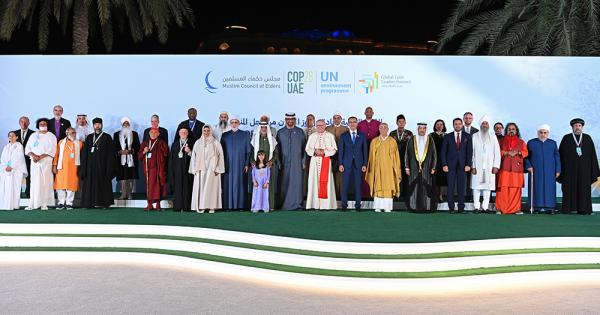Cairo, Egypt — The United Arab Emirates (UAE) recently joined a high-level regional meeting to address the growing threat of climate change across the Arab world. The event, held at the headquarters of the League of Arab States in Cairo, brought together ministers and representatives from Arab countries to find joint solutions to extreme weather events, rising temperatures, and environmental challenges.
The UAE delegation was led by Dr. Abdulla Ahmed Al Mandous, Director-General of the National Centre of Meteorology and President of the World Meteorological Organization (WMO). His participation underscored the UAE’s active role in tackling climate issues on both a regional and global level.
Dr. Al Mandous opened his address by highlighting a disturbing trend: the Arab world is experiencing a faster rise in temperatures than many other regions of the globe. According to climate reports, average temperatures in some Arab countries have increased at nearly twice the global rate. This rapid warming, he explained, is triggering more frequent and intense weather events such as heatwaves, droughts, flash floods, and sandstorms.
“Climate change is not a future threat. It is happening now, and we are already witnessing the consequences,” said Dr. Al Mandous. “The Arab region is particularly vulnerable, and we need immediate and united action to protect our people, economies, and future generations.”
$60 Billion in Economic Losses
One of the most alarming issues discussed at the summit was the rising cost of climate-related disasters. Dr. Al Mandous referenced United Nations data showing that the Arab region has already suffered an estimated $60 billion in economic losses due to extreme weather. These losses stem from damaged infrastructure, destroyed crops, forced migration, and disruptions to water and energy supplies.

He warned that if climate action is delayed, these losses will only increase in the years to come. “The financial damage caused by climate change is staggering. But what’s more devastating are the human costs—loss of lives, homes, and livelihoods,” he added.
Water Scarcity a Major Threat
In addition to financial damage, water scarcity is emerging as one of the most pressing environmental issues for Arab countries. Many nations in the region already face high water stress due to limited rainfall and overuse of natural water resources.
During the meeting, Dr. Al Mandous warned that if no action is taken, water shortages could seriously impact agriculture, public health, and long-term economic stability. “We are approaching critical levels of water scarcity. Climate change is intensifying this crisis, and it demands strategic planning, investment, and cooperation among all Arab states,” he said.
Building Regional Cooperation
The meeting of the Council of Arab Ministers on Meteorology and Climate aimed to strengthen collaboration between member countries. Ministers discussed plans to improve weather forecasting, disaster preparedness, and climate adaptation strategies. The goal is to create a regional framework that allows Arab countries to share data, resources, and expertise.
One major outcome of the meeting was the adoption of a roadmap for capacity development in the meteorological sector. Supported by the World Meteorological Organization, this plan includes training programs, technology upgrades, and knowledge exchange between countries.
According to participants, the initiative will help countries build stronger early-warning systems and improve climate-related decision-making. It will also support the creation of national climate strategies that are aligned with the United Nations Sustainable Development Goals (SDGs).
“The future of the Arab region depends on how well we prepare for climate change,” said one official attending the summit. “We need joint efforts, science-based planning, and political commitment to protect our environment and build resilience.”
UAE’s Ongoing Climate Efforts
The UAE has been at the forefront of climate action in the Arab world. In recent years, it has launched a number of initiatives aimed at reducing carbon emissions, conserving water, and investing in renewable energy sources like solar and wind. The country’s leadership in sustainability was further highlighted when it hosted the COP28 UN Climate Conference in 2023, where global leaders gathered to discuss climate policies.
Dr. Al Mandous emphasized that the UAE remains committed to supporting its regional neighbors in achieving shared climate goals. “Climate change does not recognize borders. We must work together, share solutions, and build a climate-resilient future for the entire Arab region,” he stated.
He also praised the Council of Arab Ministers for their dedication to long-term collaboration, noting that such meetings play a vital role in uniting efforts and accelerating progress.
Looking Ahead
As the summit concluded, delegates agreed that urgent, coordinated action is needed more than ever. With the Arab region facing increasing environmental stress, the time to act is now.
In the months ahead, countries will begin to implement the decisions made at the summit, including developing national adaptation plans, strengthening meteorological infrastructure, and launching new public awareness campaigns about the risks of climate change.
While the challenges are great, the unity and cooperation shown at the Cairo summit offer hope for a more sustainable and secure future.
“We are not powerless,” said Dr. Al Mandous in his closing remarks. “By acting together, we can protect our environment, our economies, and our people from the worst impacts of climate change.”
UAE and South Korea Sign Strategic Agreement on KF-21 Fighter Jet Program



